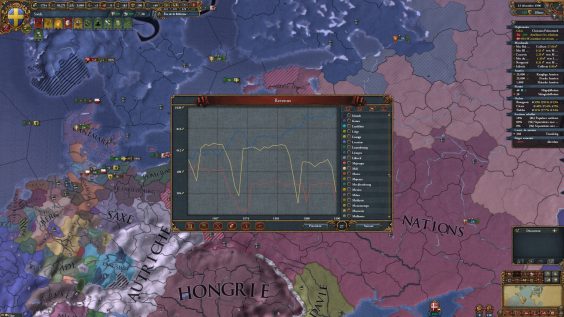
Introduction
EU4 is a deeply wonderful game, but also a deeply frustrating game to newcomer and old grognard alike. These tips and tricks, arranged in no real order, should help ameliorate that frustration. A little. It’s still a Paradox game, after all.
Military
In combat, Discipline is king. This is primarily because it and morale are the only two things you can really control.
The optimal army composition mid- and late-game is 4 cav, and one art per inf. Therefore, add a few extra cav and inf so you can detach them to occupy provinces. I particularly like 14/6/10 inf/cav/art, which gets the maximum bonus against 2nd level forts.
If you’re short on manpower, especially going into a war, raise more troops. You’ll take fewer losses that way.
Similarly, if you have to hire mercenaries, do so early in a war, not as a last gasp.
Dead mercenaries don’t have to be paid. Don’t be afraid to take risks with them.
When detaching single regiments to siege down unfortified provinces, take ones with low drill first.
A single regiment will suffice for an unfortified province if you control a province bordering it. Otherwise send two.
Similarly, as nearly all naval landings take more than a month, you will need to send at least two divisions to take an unfortified, unguarded island.
Forts on islands might seem inefficient, as they can’t guard any other provinces. But the enemy will have to move significant numbers of troops to besiege them, allowing you to intercept and sink them.
This is especially powerful when combined with +garrison size modifiers, which also affect the minimum number of regiments to siege a fort.
Mil tech first, mil ideas second.
Galleys, in an inland sea, will beat an equivalent weight of heavy ships. This is because heavy ships take up three combat width each.
Light ships will still get slaughtered though. Use them for blockades, protecting trade, and privateering only.
AI allies will always march to the war, even if it’s half a continent away. Never count on them not turning up.
Always assume that neutral nations will grant military access. The only safe gap is clear water.
No-one conquers who doesn’t fight. But no-one loses battles who doesn’t fight.
While the best Naval Doctrine is debatable, Ship Boarding is certainly the funniest.
That being said, go for Free Oarsmen if you’re using galleys, Fleet in Being if you’re short on cash, and Merchant Navy if you aren’t going to try and fight anyone on the seas, and are just going to use light ships for the money.
As a Steppe Horde, razing a province gives you all its loot. So don’t bother looting provinces you intend to take and raze.
Diplomacy
Once you get to a reasonable size, regularly check in the diplomatic macro builder for nations that will transfer trade power to you, or which will become your vassal. For the latter, you will generally have to judge if they’re worth the trouble, but remember that diplo-annexation causes no AE.
When vassalising nations, try to choose ones with lots of cores on other nations. The reconquest wars will generate less AE, and the vassal will love you for returning its provinces.
AI-controlled colonial nations will accept full annexation surprisingly early in a war.
The concede colonial area CB also prevents the nation from founding any more colonies in that colonial area for the next five years.
Improve relations also affects how quickly AE decays.
Imperialism is a very powerful CB, especially because it generates less AE. Therefore, try to ensure you have little AE when you discover it, so you can immediately put it to use.
Colonial nations can declare wars on other colonial nations and primitives, if they have a CB. You can also tell them to do so as a subject interaction. Give them subsidies, and build Shipyards and Soldier’s Households in their provinces, and enjoy.
Privateering your rivals can give up to +10 Power Projections per rival. This is worth doing, with any money a bonus.
The best way to gain a province is without effort: Threaten War and colonising subjects are ideal for this.
You can vassalise allies of an enemy in a war, as long as you occupy their capital.
By going to war with nations as soon as the truce expires, you can prevent large coalitions from forming. This is somewhat risky.
It’s better to break a royal marriage then declare war than to just declare war. That way you don’t suffer a point of war exhaustion.
Economy
Gold provinces are always good. Know where they are, and be prepared to divert to get them. Building a university there once you can is also a good idea, so that you can put spare diplomatic monarch points into their production.
The Grant Monopoly estate privileges give you 8 years of income, but last 10 years. Their real power is that they give you mercantilism, and increase the happiness of the corresponding estate without increasing its influence.
As the granting of a monopoly loses you money, grant the smaller ones first.
The ‘Exclusive Trade Rights’ Burghers estate privilege is available if you have three CoTs in a node. It grants 3 mercantilism when granted. Therefore, by repeatedly granting and revoking it, you can get lots of mercantilism.
The same works with ‘Patronage of the Arts’, but for prestige.
As long as the loyalty equilibrium for all of your estates is at least 45%, you can safely seize land by letting their loyalty drift back to equilibrium, and then calling a diet.
Parliaments are nice, but generally not worth the loss of the Diet and the Nobility estate’s +20% manpower recovery rate. Peasant republics never have the Nobility estate anyway, so might as well.
Two government types – Merchant Republic and Pirate Republic – have no estates. Therefore, before converting to either, sell off crown land, and grant any privileges with immediate positive effects.
Colonial nations are worth it for the extra merchant and occasional help in wars alone. Any tariffs are a bonus.
Treasure fleets, on the other hand, can be very nice.
If someone is raiding your coasts, a single ship hunting pirates can almost entirely neuter them. Assuming no-one is privateering in the node, that is.
If someone does that to you, just put your whole navy on privateering in that node.
This is also a great way to steal other nations’ treasure fleets.
Higher-tech light ships are significantly better in terms of trade power.
There are a bunch of events that can trigger if you have ships privateering. They are mostly good, and one can give you an explorer!
The bonus from building a furnace applies to all your provinces. No, it doesn’t mention that anywhere. Yes, that is exceptionally powerful.
As such, grab coal provinces when you can. There are a few that can be colonised: Bengkulu in Malaya, Roggeveld in South Africa, and Verkhoyansk in Siberia are often easy enough to grab.
Spending monarch power to lower inflation or war exhaustion is almost always worth it, if they’re above 2.
The first bit of automatic inflation or war exhaustion reduction is the most valuable.
Corruption is bad, but running out of money is worse. Only pay to reduce corruption when either it’s crippling, it won’t reduce naturally, or you have nothing better to spend the money on.
Looting is an important source of income early game and for steppe hordes, but don’t forget to actually win the war.
Taking ducats in a peace deal causes inflation. War reparations don’t.
Every so often, check that no states have unecessary edicts enabled.
Looting is not profitable on its own, but damages the enemy significantly, and helps defray the costs of war.
Ideas
The best policy in the game is Weapon Quality Standards (Quality + Economic), which gives +5% discipline. The second best is Production Quotas Act (Quantity + Trade), which gives +20% goods produced.
Because of this (and because they’re all good idea groups), either of those pairs makes for a solid start to your ideas.
Quantity is particularly nice for your first idea group, as its best ideas are the first two. Grab those, and then only get more when you’re up-to-date in military technology.
The Diplomatic idea group is worth it if you’re trying to become Holy Roman Emperor. Otherwise, there are probably better ones.
Aside from Diplomatic, Trade and Maritime are the best Diplomatic idea groups. Exploration is crucial if you want to be there first, and meh otherwise.
With Exploration, you can always take the idea group, hire a bunch of Explorers & Conquistadores, then remove the idea group.
For the Military idea groups, Aristocratic/Plutocratic are dodgy as half of their bonuses aren’t even military in nature, and Naval is almost never worth it. The rest are all good.
MP guides will tell you to almost always pick Defensive first. This is true, but only for MP.
For the Administrative idea groups:
- Admin is rubbish. The finisher is nice, but not worth the poor ideas.
- Economic is lovely, and gives access to the best policy in the game. It also has an event associated with it that gives you a large lump sum of money.
- Expansion is the best group for colonisers, and the other bonuses are also quite good. Pick instead of Exploration if you think you can get away with it.
- Religious is poor, but sometimes necessary, and has some lovely policies. Pick early or not at all.
- Humanist is what you pick when you have no choice. It can be worth taking just the first idea, converting provinces, and then removing the idea group. Not as bad as some people say, especially for conquerors.
- Innovative is subtly powerful. Scientific Revolution is obviously great, but Optimism will keep your War Exhaustion at zero, and the finisher is best thought of as letting you promote your advisers another tier, at roughly the same price. Also, the policies are good.
Religion
Negative tolerance gives penalties to goods produced as well as unrest. As such, the Clergy privilege ‘Enforced Unity of Faith’ and the Hindu decision ‘Anti-muslim Edict’ are rarely worth it.
If you’re going to convert to Protestant or Reformed, do so straight after they appear. The first three nations to adopt these faiths will generate a Center of Reformation in their territories.
If the HRE signs a Treaty of Religious Peace, you can become Emperor as Orthodox, but not as Coptic.
Certain provinces give extra missionaries:
- Rome for non-Catholic Christians
- Jerusalem for Jews, Muslims and Christians
- Mecca for Christians
- Mecca and Medina together, for Muslims.
- Alexandria, for Copts.
- Varanisi, for Hindus.
- Pataliputra, for all Buddhists
- Lhasa, for Vajranaya Buddhists
- Kandy, for Therevada Buddhists
- Louyang, for Mahayana Buddhists
- Doaba, for Sikhs
Yes, that does mean that Copts can get three extra missionaries, just by conquering the right provinces.
And another from defender of the faith. Still, if you manage that as a Coptic nation, you bloody well deserve it.
Anything that gives + religious unity is powerful, as it means you can conquer a few provinces at a time, and still have no penalties from religious unity.
The religious idea group is only worth it if you have no other way to get another missionary, but still need to convert lots of provinces.
Alternatively, take it second with defensive first, and laugh as your opponents suffer 3% attrition base from the Defensive idea group finisher and the Edict of Resistance policy.
Seriously though, only take Religious if you absolutely need it, and do so early. The CB stops being useful once Imperialism arrives.
Exploiting development makes it easier to convert provinces, and also slightly cheaper. But the gain is affected by local autonomy, so increase that second.
Institutions
Notes on obtaining institutions:
- Feudalism: if you’re in the Americas, there’s a path for you to get this. Otherwise, try to befriend an adjacent nation with this institution. Even if they don’t offer knowledge sharing, it’ll still give you more spread. Alternatively, simply conquer land which has this institution.
- Renaissance: A bugger. No spread other than adjacency. If you’re east of the Ottomans, you’ll have to spawn this in yourself by increasing development.
- Colonialism: spreads from friendly ports, but otherwise similar to the Renaissance. If you can make a colonial nation do so. There is an event (Grant Colonial Charter) that will give you 100 support for colonialism in a province, if you either have Quest for the New World or it’s the Age of Reformation, and you own at least one province in the New World, and one in the Old World.
- Printing Press: if you’re Protestant or similar, this’ll happen naturally. Otherwise, and if you aren’t close enough for natural spread, your best bet is increasing development. Again.
- Global Trade: high trade value is key. Build those marketplaces, and keep autonomy low. It’ll also spread in all provinces with Printing Press, but too slowly to be much use.
- Manufactories: just build manufactories in high development provinces.
- Enlightenment: similarly, build universities. A philosopher or natural scientist will help a little, but your capital should get plenty of spread anyway. A slight reason to have a Parliament.
- Industrialisation: same as Manufactories.
Tips for spawning institutions with development:
- Choose a good province: farmlands, not tropical or arid or arctic, a center of trade. Remember that CoTs affect all provinces in the state, not just the province it’s in.
- Producing cloth reduces development cost by 10% in that province.
- Use the Encourage Development edict. Do remember to switch it off when you’re done.
- With no modifiers it’ll cost about 2000 monarch power to go from 0 to 100. But practically I try to save up about 1500.
- Traders estate >60% loyalty will lower development cost.
- Temporary modifiers are useful. Don’t be afraid to spend what you have while one is on the relevant province.
- Your capital gets cheaper development, proportional to your total development.
- It’s generally inefficient to spawn more than two institutions in the same province: the cost is quadratic, but the gain is linear.
- Exploit development, to lower the cost.
Some institutions (Manufactories, Enlightenment and Industrialisation) spread from buildings. use the development mapmode to identify high-dev provinces, and build those buildings (manufactories, universities and manufactories, respectively) in the relevant provinces before the institution spawns
If you get Knowledge Sharing from someone, put the Advancement Effort edict on in your capital.
Governments
The best government types are those which don’t have Stability hits on monarch death. So if you’re a monarchy, pick States-General and enjoy.
For Republics, Sortition is best, as all the candidates have buffed stats, and you can afford to pick if you absolutely must. The -0.10 corruption is also very nice.
For Theocracies, the equivalent of States-General is called Open Public Elections, and is also good, even though theocracies don’t normally lose Stability on the monarch’s death.
Just being able to choose from two sets of monarch stats is powerful, as are the bonuses from either side.
You can always pick Clerical State and then reform to Monastic Order once you’ve got enough reform points for the 6th level reforms.
Theocracies are actually rather good and have some very powerful government reforms. For Catholics or Scots, Monastic Breweries gives powerful economic bonuses, and some very funny titles.
For Muslims, feudal Theocracy has an interaction that for 50 Mil points, gives you claims on all adjacent provinces owned by heretics or heathens. This is sort of good.
Other
Simplified terrain mapmode shows clearly which provinces have rivers between them.
Discipline is the best military modifier. Goods produced is the best economic modifier. For diplomacy, improve relations is best for conquerors, while diplomatic reputation is better for more peaceful nations.
If going for a conquest-based achievement that is not time limited, be patient. The unrestricted coring range ability in the Age of Revolutions and the AI’s general difficulties mean you can do more in the last 50 years of the game than in the first 300.
Before embarking on a run aimed at a particular achievement, carefully check the precise requirements. (This one was learned the hard way…)
The ‘Strong Duchies’ Nobility privilege grants +2 diplomatic relations. While it requires at least two vassals/marches to issue, it only goes away if you have none. Therefore, by keeping a single vassal around, you get an extra diplomatic relation.
Additionally, while it requires two vassals or marches to issue, the -10 Liberty Desire works on all subjects, even colonial nations.
If the Diet asks you to recover your manpower reserves, this can be done by waiting, exploiting development, slackening recruitment standards, or by lowering your maximum manpower.
If a ruler with a weak claim ascends to the throne, pretender rebels will rise up. If they win, the new ruler with have 95 legitimacy. This is often worth it. You can check the pretender’s stats as part of the rebels’ demands.
Lastly, when in doubt, go forth and conquer!
Hope you enjoy the post for Europa Universalis IV Strange Tips and Tricks, If you think we should update the post or something is wrong please let us know via comment and we will fix it how fast as possible! Thank you and have a great day!
- Check All Europa Universalis IV Posts List


Leave a Reply